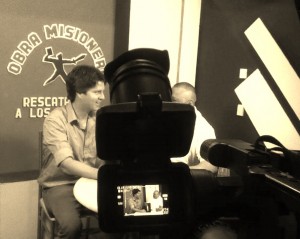Engaged Anthropology Grant: Kevin O’Neill

Kevin O’Neill is a Professor in the Department for the Study of Religion at the University of Toronto. In 2006 while a doctoral student at Stanford University, he received a Dissertation Fieldwork Grant to aid research on ‘Producing Christian Citizenship: Evangelical Mega-Churches in Postwar Guatemala City,’ supervised by Dr. James Ferguson. In 2010 he received a Post-Ph.D. Research Grant to aid research on ‘Two Ways Outs: Christianity, Security, and Mara Salvatrucha’. In 2014 he received an Engaged Anthropology Grant to aid engaged activities on ‘Secure the Soul: A Public Conversation,’ 2015, Guatemala.
July 2015 proved to be a whirlwind. The Engaged Anthropology Grant supported a wide range of events, big and small as well as private and public. These were conversations, meals, moments of outreach, and student mentorship programs that connected colleagues and collaborators. The fieldwork itself shuttled between several sites in Guatemala City and the United States. Each opened a window into a tightening relationship between new forms of Christianity and gang prevention. One field site was Guatemala’s prison system, in which prison chaplains provide prisoners with psycho-theological support. Another field site was a reinsertion program for ex-gang members. The program connected former gang members with jobs in the formal economy. And yet another field site was a growing number of Christian drug rehabilitation centers that often house active gang members in the hopes of converting them out of gang life. There are other field sites, but this selection gives a quick sense of the different actors that my fieldwork engaged. And the aim of the Engaged Anthropology Grant was to bring some of these actors together, to have them engage my work but also each other. In this regard the month proved a tremendous success. There were meetings with prison chaplains and prisoners, hours spent with students at my host university, and long conversations with gang ministers as well as prison and drug reform commissions. All of it culminated in what I think was a poignant and powerful TV interview between me and my main informant. But more on that in a moment.
The Post-Ph.D. Research Grant supported research for the 2015 publication of Secure the Soul: Christian Piety and Gang Prevention in Guatemala. The book makes the argument that underlying Central American efforts at security is a sense of Christian piety—that is, an aspiration to be a better person. It is this Christian piety that provides Central American security with its moral coordinates. At the center of this argument sits the story of a key informant, a man that I call Mateo. His life connects the book’s various chapters. A deported gang member from Los Angeles, Mateo has been the subject and the object of Christian piety most of his life. He gained tremendously from prison chaplains while serving time in Los Angeles and yet he also served as a prison chaplain in Guatemala City; Mateo has worked for reinsertion programs while also having engaged these very programs as a former gang member; he has also been held inside a Christian rehabilitation center and yet months later found himself working for one. Yet more than just connecting the research’s ethnography with a single story, his life also embodies a sense of Christian piety—this idea/aspiration/affect that one should always strive to be a better person.

Secure the Soul ends with Mateo adrift. Aging out of not just gang life but also Central American security programs, the book ends at a moment of indecision. It is not clear what Mateo will do with the rest of his life. And yet while my research ended, Mateo’s life obviously kept on going. And there was a rough patch. He lost his house. A member of Barrio 18 stabbed him with a screwdriver during a street fight. And he ended up in prison for three months on trumped up drug charges. But then, true to Mateo, he turned his life around, connecting with a missionary project outside of Guatemala City. He now supports the ministry’s activities while also preaching to youth. This includes a weekly television program.
For those familiar with the book, Mateo’s life history provides Secure the Soul with its narrative spine. And for those familiar with ethnography, a project like that entails a tremendous amount of not just trust but also time. Mateo and I spent hours thinking through and recording his life story. Sometimes this took place while walking the streets of Guatemala City and other times this took place on his couch, with Mateo stretched out as if in the middle of a therapy session. And so it came with great excitement to learn that Mateo not only had air time but that we would also be able to spend that time talking about Secure the Soul—with the roles reversed. He would interview me.
It was an amazing experience. As we sat waiting for the camera to turn on, for us to go live, I turned to Mateo. Filled with pride for his life but also for what we had done together (in regards to the book) it suddenly hit me how far this project had gone. I can still remember the first time I met Mateo in a Guatemala City church. I can also remember the first interview we ever did together. And as the producer counted us down from ten to one, to signal the start of the show, I turned to Mateo with no small amount of astonishment—about his life and this book. I asked him how he felt about it all. Feeling rushed by the counting and slightly distracted by the glare of the lights, Mateo just smiled and said, “Look, bro, it’s my turn to ask the questions.” And so he did.